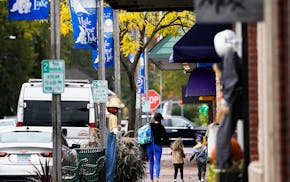A failed shot at making transit greener than green has some in Shakopee turning a deep shade of red.
Scott County's first transit station, which opened three years ago, was billed as "eco-friendly" for its paving bricks and rain gardens. It turned out to be a $50,000 "oops."
The porous pavers, designed to let Mother Nature cleanse pollutants in the soil rather than sweep them off into nearby bodies of water, sank under the buses' massive weight. And the rain gardens turned into a decaying, weed-infested mess.
Scott County's public works chief, Lezlie Vermillion, isn't mincing words. "We failed," she said.
"I learned from a professor at the U," she added, "if you are afraid to show the public your mistakes, skip civil engineering."
The station, called Southbridge Crossings, was designed in part to lure motorists away from an increasingly overburdened Bloomington Ferry Bridge, over the Minnesota River at Hwy. 169.
The station opened in 2007. By 2009, officials say, the pavers were sagging so much under the pressure of the buses' starts and stops that the contractor replaced them. But it became obvious that wasn't going to fix things for good -- and replacing them every 12 to 18 months was going to cost $6,500 a year. Better to scrap the whole idea and go to concrete.
The rain garden, meanwhile, was suffering as well. The mulch decomposed, and the plants grew "choked with weeds," in the words of a memo from one local official. The plan now is to replant them with a weed-reducing fabric liner.
The rain gardens "were maintained as directed by the design firm," Vermillion said. "Some weeding was done, but ... it was also important to let the vegetation establish itself without disturbing. In trying to strike that balance and for whatever reason, the weeds won the battle, and we need to revamp that area."
Metro Transit, an arm of the Metropolitan Council, which helped fund the project, says it doesn't believe in designing bus-carrying surfaces with pervious pavers.
"If they're already in place, we usually replace them with concrete," Met Council spokeswoman Bonnie Kollodge reported after checking with her agency's experts. "As to rain gardens -- they're a great way to help control runoff but require considerable care during the first three to four years until well developed."
Vermillion insists the pavers have worked in transit settings.
"Our design committee -- which was the county, cities and consultant -- determined that pervious pavement and bio-swales would be appropriate techniques to use in this area," she said. "We also believed that the pavers would be more aesthetically pleasing from a user's perspective." The county found that Southwest Transit and the Minnesota Valley Transit Authority, two major suburban transit operators, had successfully used pavers in their transit stations.
The problem came to light when officials in Prior Lake, which is a partner in the project along with Shakopee, asked their city council to authorize the writing of a check to cover part of the $50,000 cost. The money would then be reimbursed by the Met Council, they were told.
Prior Lake's transit director, Jane Kansier, explained in her background memo that the original warranty has now expired. Federal funds that could have been used for other purposes will cover the cost, officials said.
None of this should be taken as a criticism of pavers or rain gardens, Kollodge said.
"We advocate use [of] low-impact development like rain gardens and pavers, where appropriate," she said. "We always stress that the practices must be designed properly, must be installed properly and must be maintained properly to be effective. If any of those three fall short, the practice may fail."
Lesson learned, Vermillion said.
"We are replacing [pavers] with concrete and avoiding further settlement. From this experience we will not be installing pavers at Eagle Creek," the county's next transit station, "but placing concrete right from the start."
David Peterson • 952-882-9023

Minnesota added thousands of jobs in March but worker shortage still an issue
Private prison van driver, accused of raping St. Paul woman he was transporting, gets 30 years for similar attacks

Shop the curbs for free on 'Trash to Treasure Day' in White Bear Lake
Longtime Uptown boutique closing in May

